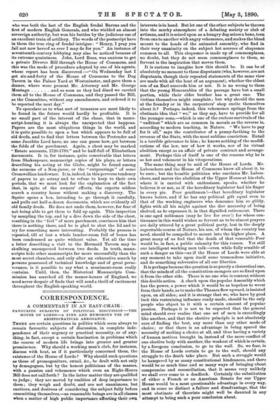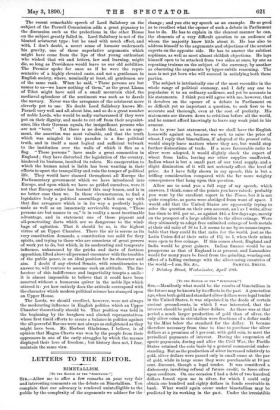CORRESPONDEN CE.
A COMMENTARY IN AN EASY-CHAIR : FAVOURITE SUBJECTS OF POLITICAL DISCUSSION -THE HOUSE OF LORDS-A FINE AND HUMOROUS USE OF ARISTOCRATICAL ARROGANCE.
THERE are certain questions in politics which seem always to remain favourite subjects of discussion, in complete inde- pendence of their urgency or practical necessity, or of any- thing, in fact, except a certain fascination in problems which the course of modern life brings into greater and greater prominence. Why should a working man's club, for instance, discuss with heat, as if it particularly concerned them, the existence of the House of Lords ? Why should such questions as those of promogeniture, entail, &c., be dealt with not only by demagogues, but by the honest politicians of the masses, with a passion and vehemence which even an Eight-Hours Bill does not call forth ? In the latter matter they are qualified to judge ; they are moved by realities of deep importance to them ; they weigh and doubt, and are not unanimous, but cautions, and desirous of considering the subject fully before committing themselves,—as reasonable beings are in all classes when a matter of high public importance affecting their own interests is in hand. But let one of the other subjects be thrown into the murky atmosphere of a debating society or club of artisans, and it is seized upon as a hungry dog seizes a bone, torn from one to another with angry vehemence, and makes the blood mount to the heads of the animated assembly, who find in their very unanimity on the subject hot sources of eloquence common to alL This eloquence is made up of commonplaces, no doubt, but they do not seem commonplaces to them, so fervent is the inspiration that moves them.
It is curious to imagine how this should be. It can be of absolutely no moment to these disputants (who, however, are not disputants, though their repeated statements of the same view are made with all the heat of an argument), whether the eldest son of an Earl succeeds him or not. It is no wrong to them that the young Honourables of the peerage have but a small portion, while their elder brother has a great one. The victims themselves might complain ; but why should the men at the foundry or in the carpenters' shop excite themselves about it ? Perhaps, indeed, this vehemence springs from the obstinate idea that " we," as they say, have to provide for all the younger sons,—which is one of the curious survivals of the " unfittest " which are as common in morals as the reverse is, according to modern teaching, in Nature. " We have to pay for it all," says the contributor of a penny-farthing to the revenue of the State, with the most sublime conviction. Entail is a terrible grievance to him ; he knows nothing of the modifi- cations of the law, nor of how it works, nor of its virtual abolition except as an affair of private contract and arrange- ment. Perhaps this of itself is one of the reasons why he is so hot and vehement in his vituperations.
The same thing may be said of the House of Lords. Mr. Labouchere and the House of Commons know all about it, to be sure ; but the humble politician who emulates Mr. Labou- chere, and moves the abolition of the Upper House at his club, where it is carried with enthusiasm, speaks, whether he believes it or not, as if the hereditary legislator had his finger in every pie. Poor gentleman !—that hereditary legislator knows better, and if he has any political gift equal even to that of the working engineers who denounce him so glibly, fights with all his might against the dire necessity of being shelved, as he expresses it, in that dignified retirement. There is one aged nobleman (may he live for ever !) for whose con- tinuance in this world wishes so fervent as to be almost prayers are daily uttered by a great political party, lest in the deeply regrettable course of Nature, his son, of whom the country has need, should be compelled to mount into the higher place. A great many of us feel that the death of that venerable Peer would be, in fact, a public calamity for this reason. Yet still our intelligent working men talk—even while fully sensible of such a danger as this—as if the House of Lords were able at any moment to take upon itself some tremendous initiative, and do something subversive of all our liberties.
It is perhaps because the question is so purely a theoretical one, that the minds of all the constitution-mongers are so fixed upon it from the other side. There is no one who is content without this double action. A check upon the popular Assembly which has the power, a power which it would be as hopeless to wrest from their hands, as to make the Thames flow upward, is insisted upon, on all sides ; and it is strange that we, who have by good luck this restraining influence ready-made, should be the only people who object to it with a certain amount of popular passion. Perhaps it is not to be expected that the general mind should ever realise that one set of men is exceedingly like another, and that the elective principle is not absolutely sure of finding the best, any more than any other mode of choice; or that there is an advantage in being spared the necessity of making a choice at all, and thus having a variety of human motives brought in, instead of the mere conflict of one elective body with another, the weakest of which is certain, by a foregone conclusion, to go to the wall. So, we fear, is the House of Lords certain to go to the wall, should any struggle to the death take place. But such a struggle would be hampered by so many constitutional hindrances, and there would be so much time and so many ways of bringing about compromise and reconciliation, that it seems very unlikely we shall ever come to a deadlock. Certainly the substitution of either a French or an American Senate for our Upper House would be a most questionable advantage in every way, and in some so distinct a failure and disadvantage, that the most obstinate of theorists might well be daunted in any attempt to bring such a poor conclusion about The recent remarkable speech of Lord Salisbury on the subject of the Parnell Commission adds a great piquancy to the discussion such as the prele,ctions in the other House on the subject greatly failed in. Lord Salisbury is not of the bloated aristocrat type : but he used with much effect, and with, I don't doubt, a secret sense of humour underneath 'his gravity, one of those superlative arguments which -might have come from the lips of that young enthusiast who wished that wit and letters, law and learning, might -die, so long as Providence would leave us our old nobilities. The Premier spoke for once as if he were the repre- sentative of a highly elevated caste, and not a gentleman in English society, where, nominally at least, all gentlemen are of the same rank. When he said, " These persons are but names to us—we know nothing of them," as the great Llama of Tibet might have said of a small mountain chief, the mediaeval splendour of the sentiment was such as to dazzle the unwary. Never was the arrogance of the aristocrat more cleverly put to use. No doubt Lord Salisbury knows Mr. Parnell very well and all about him, and so do a great number of noble Lords, who would be sadly embarrassed if they were put on their dignity, and made to cut off from their acquaint- ance, like their German equals, the insignificant persons who are not "born." Yet there is no doubt that, as an argu- ment, the assertion was most valuable, and that the truth which was mingled in this paradox is a fine political truth, and in itself a most logical and sufficient bulwark to the institution over the walls of which it flies as a flag. " These persons " have made a great commotion in England ; they have disturbed the legislation of the country, hindered its business, insulted its rulers. No exasperation to which the human mind is liable has been wanting in their -efforts to upset the tranquillity and ruin the temper of political life. They would have shamed throughout all Europe the Parliamentary government which we have introduced into Europe, and upon which we have so prided ourselves, were it not that Europe entire has learned this easy lesson, and is in no better case than we. In these circumstances, to find a legislative body a political assemblage which can say with that fine arrogance which is in its way a perfectly legiti- ---mate as well as an immensely serviceable weapon, " These persons are but names to us," is in reality a most inestimable advantage, and in statement one of those piquant and all-penetrating darts which are so dangerous to the wind- bags of agitation. That it should be so, is the highest virtue of an Upper Chamber. There the air is serene as its very constitution demands, a constitution too mild for fiery spirits, and trying to those who are conscious of great powers of work yet to do, but which, in its moderating and temperate influence, unharassed by the pricks and darts of factious opposition, lifted above all personal encounter with the troubles of the public peace, is an ideal position for its character and aim. I doubt if any elected Senate, with constituencies to answer to, will venture to assume such an attitude. The fine hauteur of this indifference and impartiality tempts a smile it is almost impossible to believe that it could have been asserted without a humorous quiver in the noble lips which uttered it: yet how entirely does the attitude correspond with the character which modern political science has stamped upon an Upper House.
The Lords, we should recollect, however, were not always the moderating influence in English politics which an Upper Chamber theoretically should be. That position was held in the beginning by the burghers and elected representatives, -whose first timid efforts to create a balance in politics against the all-powerful Barons were not always so enlightened as they might have been. Mr. Herbert Gladstone, I believe, is of opinion that Magna Charta was won by the people from their oppressors in one of the early struggles by which the masses displayed their love of freedom ; bat history does not, I fear, maintain the same view.







































 Previous page
Previous page